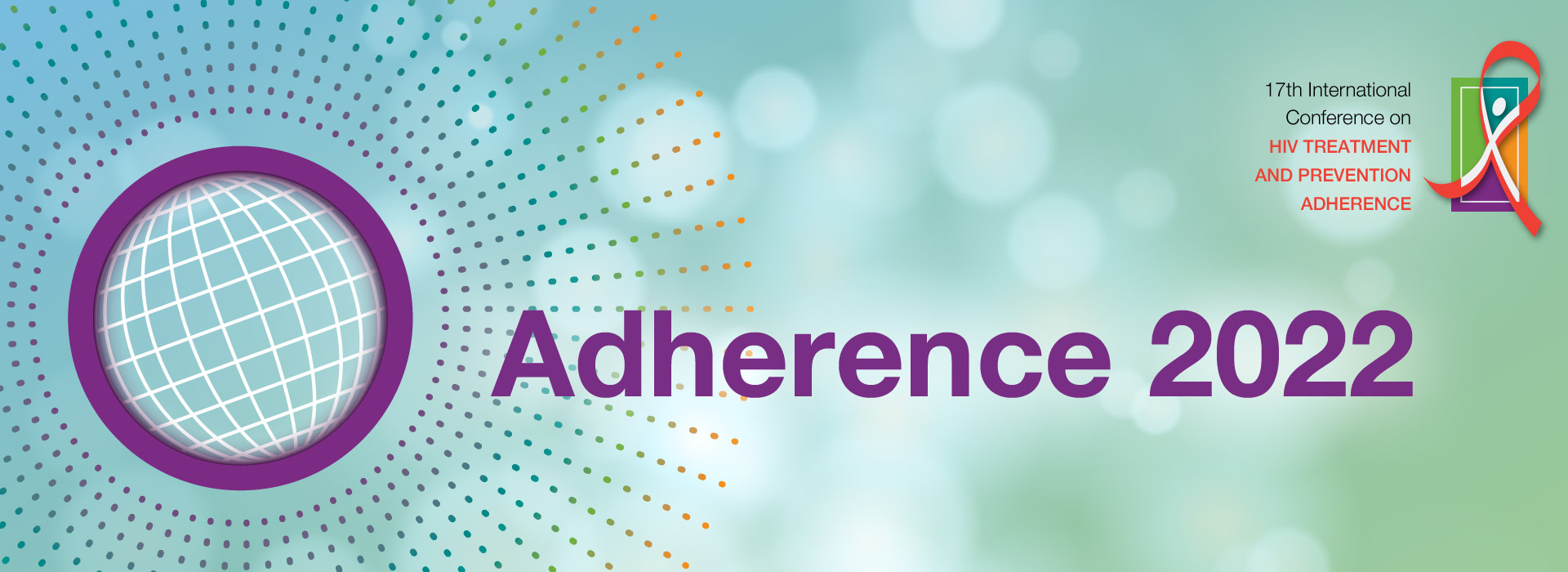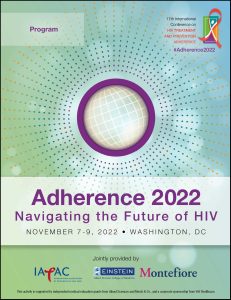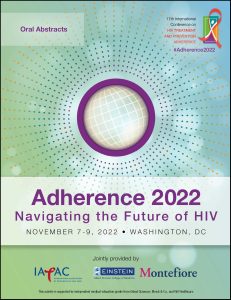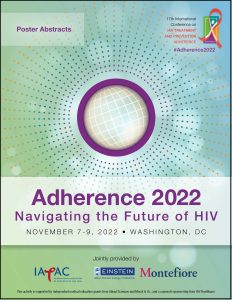Conference Archives:
GENERAL INFORMATION
The Adherence 2022 conference was jointly provided by the International Association of Providers of AIDS Care (IAPAC) and Albert Einstein College of Medicine-Montefiore Medical Center. The 2022 conference’s Co-Chairs were Jessica Haberer (Massachusetts General Hospital, Boston, MA, USA) and Jane M. Simoni (University of Washington, Seattle, WA, USA). The conference Track Chairs were:
- Optimizing ART Adherence – Jean B. Nachega (Stellenbosch University, Stellenbosch, South Africa)
- PrEP Uptake, Adherence, and Persistence – Faith Kiruthi (Nairobi City County Health Services, Nairobi, Kenya)
- HIV Care Continuum – Aadia Rana (University of Alabama at Birmingham, Birmingham, AL, USA) and Dorina Onoya (University of the Witwatersrand, Johannesburg, South Africa)
- Implementation Science – Juliet Iwelunmor (Saint Louis University, St. Louis, MO, USA)
- Community Participatory Engagement – Erika Castellanos (GATE, Amsterdam, Netherlands)
DISCLOSURE
The Adherence 2022 conference was made possible through educational grants from Gilead Sciences and Merck & Co., and a corporate sponsorship from ViiV Healthcare.
PROGRAM
Following are the Adherence 2022 conference presentations. The conference organizers request that any use of these presentations should include citations to both their presenting authors and relevant conference information (e.g., 17th International Conference on HIV Treatment and Prevention Adherence, November 7-9, 2022, Washington, DC, USA).
Requires free Acrobat Reader Plugin Software
Monday, November 7, 2022
Pre-Conference Session
Pushing Forward: How the Ending the HIV Epidemic in the US Initiative is Advancing the Implementation of Research, Prevention, and Care
Welcome Remarks
Jessica Haberer, Massachusetts General Hospital, Boston, MA, USA
Jane M. Simoni, University of Washington, Seattle, WA, USA
José M. Zuniga, IAPAC and Fast-Track Cities Institute, Tampa, FL, USA
Keynote Address
Navigating the Future of HIV: The Role of Equity, Innovation, and Solidarity
Angeli Achrekar, Office of the Global AIDS Coordinator, Washington, DC, USA
HIV Care Continuum Engagement
Moderators: Dorina Onoya, University of the Witwatersrand, Johannesburg, South Africa; and Aadia Rana, University of Alabama at Birmingham, AL, USA
Adopting Sustainable Innovations for Remote Access to HIV Care
Denise Evans, University of the Witwatersrand, Johannesburg, South Africa
Maintaining Continuity of COVID-19 Pandemic-Related HIV Services
Wendy Armstrong, Emory University, Atlanta, GA, USA
Telehealth Barriers: Overcoming Technology and Privacy Concerns
Jamison Norwood, Vanderbilt University Medical Center, Nashville, TN, USA
Implementation Science
Moderator: Juliet Iwelunmor, Saint Louis University, St. Louis, MO, USA
Discontinuation, Suboptimal Adherence, and Re-Initiation of Oral HIV PrEP
Weiming Tang, University of North Carolina at Chapel Hill, Chapel Hill, NC, USA
Social and Physical Environmental Barriers of Long-Acting ARV Adherence
Enbal Shacham, Saint Louis University, St. Louis, MO, USA
PrEP4Youth: Using Crowdsourcing to Facilitate PrEP Implementation
Titilola Gbaja-Biamila, Nigeria Institute of Medical Research, Lagos, Nigeria
Three Top-Rated Abstracts
Moderator: Jessica Haberer, Massachusetts General Hospital, Boston, MA, USA
1056 Preferences and Acceptability for Long-Acting PrEP Agents Among Pregnant and Postpartum Women with Experience Using Daily Oral PrEP in South Africa and Kenya
Nafisa Wara, University of California, Los Angeles, Los Angeles, CA, USA
1173 Electronic Dose Monitoring Feedback (EMF) with Youth: Qualitative Exploration of Reactions to Viewing their Dosing Calendars
Eamonn McGonigle, University of Michigan, Ann Arbor, MI, USA
1226 Role of Visit Type in the HIV-Related No-Shows During the COVID-19 Pandemic: A Multisite Retrospective Cohort Study
Maira Sohail, University of Alabama at Birmingham, AL, USA (PDF presentation not available)
Tuesday, November 8, 2022
Gary S. Reiter, MD, and Andrew Kaplan, MD, Memorial Lecture
Innovations in HIV: Applying Past Lessons to Accelerate Uptake of Novel Antiretrovirals
Sarah Henn, Whitman-Walker Health, Washington, DC, USA
Optimizing ART Adherence
Moderator: Jean B. Nachega, Stellenbosch University, Stellenbosch, South Africa
Optimizing Early ART Uptake and Enhanced Adherence
Susan Graham, University of Washington, Seattle, WA, USA
Optimizing ART Adherence along the Continuum: Execution
John Kinuthia, Kenyatta National Hospital, Nairobi, Kenya
Facilitating Long-Term ART Adherence to Achieve Persistence
Jean B. Nachega, Stellenbosch University, Stellenbosch, South Africa
Oral Abstracts Session: mHealth and Telehealth Interventions
Moderator: Dash Sears, Fast-Track Cities Institute, Washington, DC, USA
1082 Comparing the HIV-Related No-Show Rates by Visit Type Before and After the Onset of the COVID-19 Pandemic
Maira Sohail (PDF presentation not available)
1136 The Role of Patient Navigators and Mobile Health Units in Behavioral and Healthcare Services Delivery with Justice-Involved Individuals
Jennifer Pankow
1161 Telemedicine Implementation at a Midwestern HIV Clinic: Strategy and Year One Outcomes
Nada Fadul
Oral Abstracts Session: Adherence Monitoring
Moderator: Christopher Duncombe, IAPAC, Washington, DC, USA
1043 Screening with Patient-Reported Outcomes (PRO) Assessments to Identify Risk Factors for Suboptimal Adherence in Routine HIV Care
Duncan Short
1078 Low Intrapatient Variability in ARV Plasma Concentrations is Associated with Low Viral Load – Findings from a Longitudinal HIV Study with Ingestible Sensor Monitoring
Yan Wang
1097 Attitudes towards Participating in Digital Pill-Based Adherence Research for Oral HIV Pre-Exposure Prophylaxis Among Men Who have Sex with Men with Substance Use
Georgia Goodman
1160 Implementing MedViewer for Daily Adherence Feedback: How Feasible and Acceptable is Use of a Novel Hair-Based Antiretroviral Monitoring Tool in Busy Clinical Encounters?
Carol Golin
Oral Abstracts Session: Implementation Science
Moderator: Sindhu Ravishankar, Fast-Track Cities Institute, Washington, DC, USA
1029 Prognostic Factors Influencing Survival among Infants Enrolled for Early Infant Diagnosis (EID) Services in Women of Low Socio-economic Backgrounds in Nairobi, Kenya
Elizabeth Kiilu
1062 Client Preferences for HIV Care Coordination Program Features: Latent Class Analysis of a Discrete Choice Experiment
Madellena Conte
Sponsored Lunch Symposium
Oral Abstracts Session: Mental Health and Substance Use
Moderator: Drew Gibson, AIDS United, Washington, DC, USA
1016 Gender-Based Violence and Post-Traumatic Stress Disorder Symptoms Predict HIV Pre-Exposure Prophylaxis (PrEP) Uptake and Persistence Failure among Transgender and Non-Binary Persons Participating in PrEP Demonstration Project
Erik Storholm
1036 Hazardous Drinking, Readiness to Change, and Alcohol-Related Self-Efficacy among People with HIV Receiving HIV Care in Kinshasa, the Democratic Republic of Congo
Angela Parcesepe
1055 Results of a Community and Justice Needs Assessment for HIV Prevention and Treatment and Substance use Treatment Services for Persons Involved in the Justice System
Angela Di Paola
1092 Is Trauma Experience Associated with Poor Retention in HIV Care and Viral Suppression?
Bonnie Cruser
1154 Amphetamine use and its Associations with ART Adherence and Viral Load among Cisgender Sexual Minority Men living with HIV
Natalie Brousseau
Oral Abstracts Session: Optimizing Health Outcomes
Moderator: Helen Olowofeso, Fast-Track Cities Institute, Lagos, Nigeria
1013 Are HIV ART Adherence and Retention Rates Affected by Extreme Weather Events? Capacity Building for a Climate Resilient Healthcare System
Daniel Samano (PDF presentation not available)
1018 Understanding Disparities in Antiretroviral Therapy Adherence and Sustained Viral Suppression among US Black, Hispanic/Latino, and White Men Who Have Sex with Men
Deesha Patel
1166 Internalized HIV Stigma is Longitudinally Associated with Lower HIV Medication Adherence
Lydia Drumright
1169 Rapid RestART: A Re-Linkage Program in the South
Katherine Conner
PrEP Uptake, Adherence, and Persistence
Moderator: Faith Kiruthi, Nairobi City County Health Services, Nairobi, Kenya
Mitigating the Effects of Stigma on PrEP Uptake, Adherence, and Persistence
Nicasio Njagi Muriuki, Kamukunji Sub County, Nairobi, Kenya
Beyond Prevention: Integrating PrEP as a Whole-Person Healthcare Approach
Anthony Kiplagat, Nairobi Metropolitan Services, Nairobi, Kenya
Leveraging the Impacts of User-Centered Interventions for PrEP Optimization
Mercy Kamau, Jhpiego, Nairobi, Kenya
Wednesday, November 9, 2022
Mario S. Cooper Memorial Colloquium
Unequal and Under Threat: A Call to Action Against Inequity in the HIV Response
Jesse Milan, AIDS United, Washington, DC, USA
Sibongile Nkosi, GNP+, Johannesburg, South Africa (No PPT)
Community Participatory Engagement
Moderator: Erika Castellanos, Global Action for Trans Equality, Amsterdam, Netherlands
Promoting Choice in HIV Prevention: Pills, Rings, and Injectables
Maxi Jokonya, Y+ Global, Harare, Zimbabwe
Examining and Addressing HIV Dynamics in an Aging Population
Javier Hourcade Bellocq, Communities Delegation, Buenos Aires, Argentina
Defining ‘Communities’ in the Future of the Global HIV Response
Cleiton Euzebio de Lima, UNAIDS, Geneva, Switzerland
Oral Abstracts Session: Community Participatory Engagement
Moderator: Kalvin Pugh, IAPAC, Kansas City, KS, USA
1033 High Incidence of COVID-19 Infection and Related Stigma among a Cohort of PLHIV in Washington, DC
Shannon Barth
1081 Rural-Urban Disparities in Stage 3 HIV (AIDS) Diagnoses in Tennessee: A Guide for Targeted HIV Screening Interventions
Kevin M. Gibas
Oral Abstracts Session: Differentiated Service Delivery Models
Moderator: Christopher Duncombe, IAPAC, Seattle, WA, USA
1110 The Impact of Differentiated Service Delivery Models of HIV Treatment on 12-months Retention in Antiretroviral Therapy for Patients Enrolled in HIV Care in Mozambique
Dorlim Moiana Uetela
1112 Fidelity of Implementation of Differentiated Service Delivery Models for HIV Treatment in Mozambique in 2021
Dorlim Moiana Uetela
1125 Do Differentiated Service Delivery Models Work for Second-Line Therapy? Outcomes for South African Second-Line ART Clients Enrolled in DSD Models Compared to Conventional Care
Amy Huber
Sponsored Lunch Symposium
Oral Abstracts Session: Children and Adolescents
Moderator: Amanda Castel, George Washington University, Washington, DC, USA
1090 Navigating Barriers to Pediatric Viral Load Suppression in Rural Zambia
Marie Lichtenberg
1148 HIV Testing Drive among Out of School Youth in Blue Collar Communities
Ramon Olanrewaju Babamole
Oral Abstracts Session: PrEP Adherence
Moderator: Dash Sears, IAPAC, Washington, DC, USA
1099 Supporting the Art: Medication Adherence Patterns in Persons Prescribed Ingestible Sensor-enabled Oral Pre-Exposure Prophylaxis to Prevent HIV Infection
Sara Browne
1117 Prevention Effective Adherence to Oral PrEP among Pregnant and Postpartum Women in South Africa
Dvora Joseph Davey
1128 Acceptability of a Differentiated Package of Oral PrEP Adherence Interventions among Adolescent Girls and Young Women in South Africa: Results from the PrEP SMART Trial
Nomhle Khoza
1147 Performance and Acceptability of a Urine Point-of-Care Test for Drug-Level Feedback Counselling on PrEP Use among Young Women in South Africa
Nicole Poovan
Late-Breaker Abstracts
Moderator: Sindhu Ravishankar, Fast-Track Cities Institute, Washington, DC, USA
1229 “PrEP My Way”: A Novel PrEP Delivery System to Meet the Needs of Young African Women
Kevin Kamolloh, Kenya Medical Research Institute, Nairobi, Kenya
1247 “Give me the Kit”: Choice of Self-Collected Testing in TelePrEP
Christopher Hall, Q Care Plus, San Francisco, CA, USA
1261 Epidemic Control Efforts and Resultant Key HIV Trends in Bangkok (2018-2020)
Helen Olowofeso, Fast-Track Cities Institute, Lagos, Nigeria
Rapporteur Session
Faith Kiruthi, Nairobi City County Health Services, Nairobi, Kenya (No PPT)
Jean B. Nachega, Stellenbosch University, Stellenbosch, South Africa
Ira B. Wilson, Brown University, Providence, RI, USA (No PPT)









